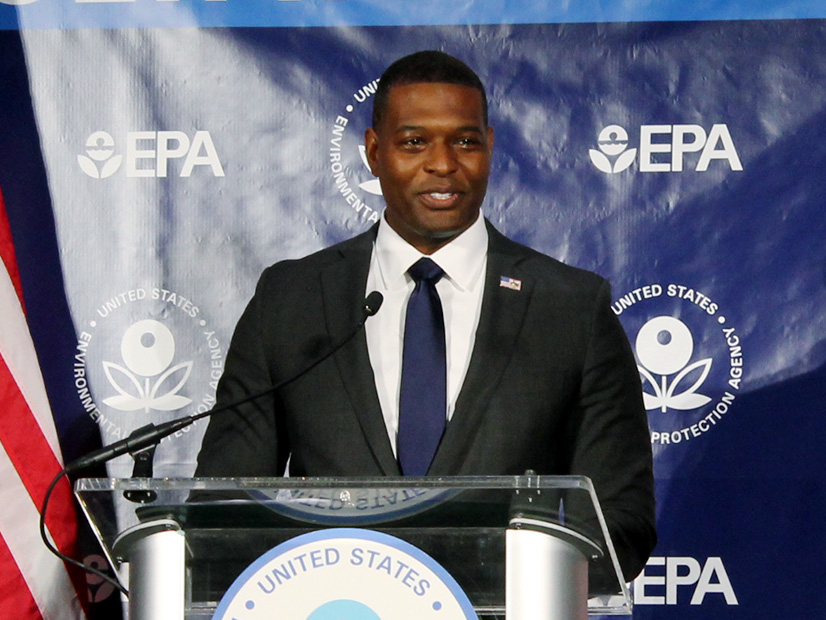Just weeks before President-elect Donald Trump returns to the White House, the Biden administration has given California permission to enforce rules that require all new cars sold in the state to be zero-emission by 2035.
EPA on Dec. 18 approved a waiver for California’s Advanced Clean Cars II rules, which require an increasing percentage of cars sold in the state to be zero-emission each year until 2035, when all new cars sold must be ZEVs or plug-in hybrids.
The agency also granted a waiver for California’s heavy-duty omnibus regulation, which sets emission standards for medium- and heavy-duty vehicles.
Opponents have 60 days to file a petition for review of the decisions.
“Today’s actions follow through on EPA’s commitment to partner with states to reduce emissions and act on the threat of climate change,” Administrator Michael Regan said in a statement.
EPA’s decision also means the 11 other states that have adopted Advanced Clean Cars II (ACC II), along with D.C., can proceed with enforcement: Colorado, Delaware, Maryland, Massachusetts, New Jersey, New Mexico, New York, Oregon, Rhode Island, Vermont and Washington.
The Environmental Defense Fund noted that ACC II jurisdictions account for 33% of the U.S. new vehicle market.
“EPA’s approval of these standards for California and numerous other states is a welcome action to reduce pollution, including in communities where it’s most needed,” Alice Henderson, EDF director and lead counsel for transportation and clean air policy, said in a statement.
The California Air Resources Board (CARB) adopted Advanced Clean Cars II in August 2022, updating its previous Advanced Clean Cars regulations. (See California Adopts Rule Banning Gas-powered Car Sales in 2035.)
ACC II begins with model year 2026, when 35% of new cars delivered for sale in California must be zero-emission.
In addition to ZEV-transition requirements, the ACC II regulation includes low-emission vehicle (LEV) rules that set emission standards for cars with internal-combustion engines.
ZEV Progress
California officials celebrated EPA’s approval of the two waivers.
“Clean cars are here to stay,” Gov. Gavin Newsom said in a statement. “Naysayers like President-elect Trump would prefer to side with the oil industry over consumers and American automakers, but California will continue fostering new innovations in the market.”
Officials noted that through the end of September, 2.1 million zero-emission cars had been sold in California, and 26.4% of new light-duty vehicles sold in the state in the third quarter of 2024 were ZEVs.
“Consumers and fleets are increasingly making the choice to drive clean vehicles, and today’s waiver approvals will further that progress,” CARB Chair Liane Randolph said.
Still, the EPA waivers — and other state climate policies — may face challenges under the new presidential administration.
During Trump’s first term as president, California filed more than 120 lawsuits challenging actions taken by his administration.
In a special session of the state legislature that began Dec. 2, lawmakers will consider funding for the state Department of Justice to quickly challenge actions taken by the Trump administration. Newsom convened the special session “to safeguard California values” — including the fight against climate change. (See Newsom Convening Legislature to Protect California ‘Values,’ Policies.)
One tool often used to overturn federal agency rules following a change in administration — the Congressional Review Act — doesn’t apply to approved California waivers, Newsom’s office recently told the Los Angeles Times.
But EPA waivers for other CARB regulations are still pending. Those include waivers for the Advanced Clean Fleets regulation, which requires truck fleets to transition to zero-emission vehicles; the in-use locomotive standards, which ban certain diesel-powered locomotives; and emission standards for small off-road engines, such as those used in landscaping equipment.
Newsom traveled to D.C. last month to push for federal approval of pending items, including the Clean Air Act waivers, ahead of the incoming administration.
“EPA continues reviewing additional waiver requests from California and is working to ensure its decisions are durable and grounded by law,” the agency said in a Dec. 18 release.
Waiver Review
Under the federal Clean Air Act, California may adopt its own vehicle emission standards, but those rules must receive federal approval in the form of a waiver from EPA. Other states may then choose to stick with federal standards or adopt California’s rules.
The idea is to strike a balance in which car manufacturers don’t face myriad emission standards, while allowing California to innovate on its own standards to combat poor air quality.
The California standards must be in aggregate at least as stringent as the applicable federal standards. In deciding whether to grant a waiver, EPA considers three “prongs,” Regan explained in his 191-page decision. The burden of proof is on opponents to show that one of the reasons for denial has been met.
The first is whether California was arbitrary and capricious in determining that its standards are at least as protective of public health and welfare as the federal standards.
The second prong addresses whether California needs the standards to meet compelling and extraordinary conditions. The third prong looks at whether the standards are consistent with a section of the Clean Air Act that pertains in part to the feasibility of technology in the lead time provided, taking cost into consideration.
In his decision, Regan addressed many of the comments EPA received arguing for or against the ACC II waiver. Commenters brought up issues such as vehicle affordability, effects on the electric grid and availability of public charging.
“Although commenters often referred to these topics to support their position that the ZEV standards either are or are not feasible … topics such as these are not within the scope of factors EPA may consider in evaluating consistency with [the Clean Air Act],” he wrote.




